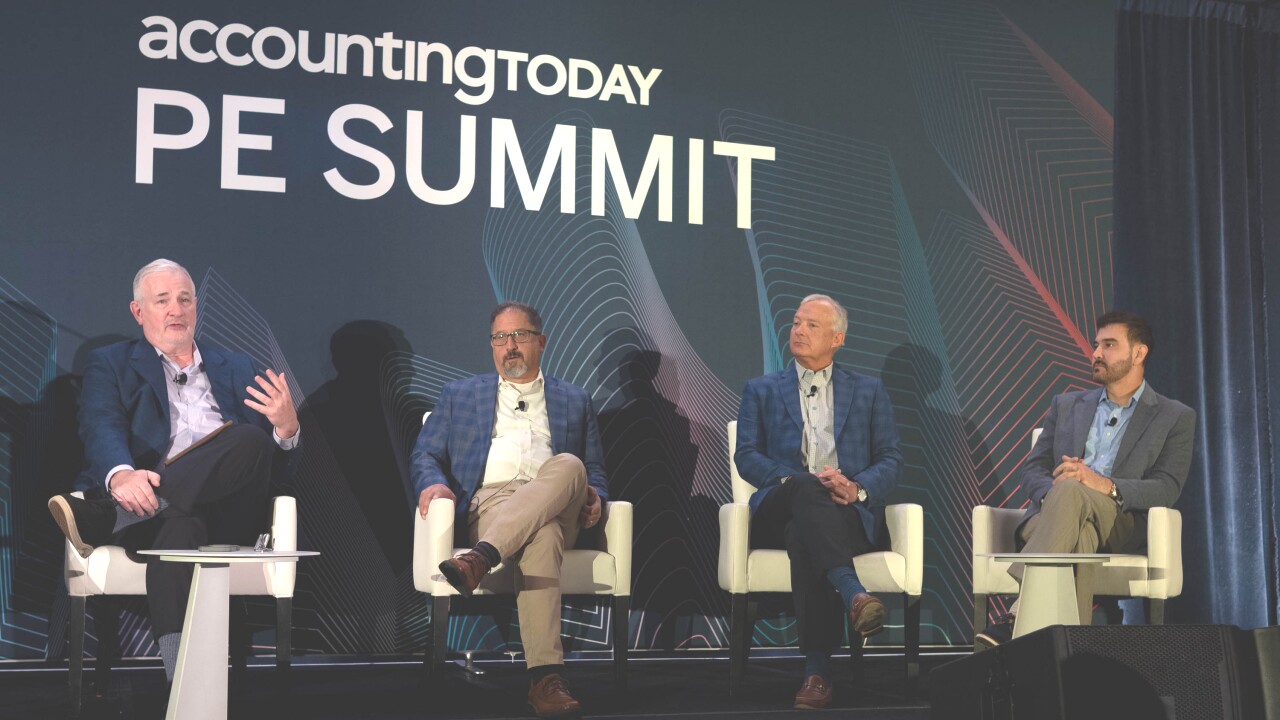Deloitte CEO Cathy Engelbert discussed how auditing firms can use advanced technologies such as artificial intelligence, data analytics and even drones to make audits more efficient.
Speaking at Financial Executives International’s Current Financial Reporting Issues conference in New York on Monday, Engelbert discussed technology and other matters facing accountants. “Clearly all the audit firms are investing heavily in innovation, transforming their audit businesses,” she said. “Certainly we are here at Deloitte. But as you think about what those innovations are, it’s very important that we do invest and we have the capital and the choices to invest to do things like using artificial intelligence to augment our audit procedures.”
She pointed to the growing volume of data and the need to use analytics technology to process it all.
“In the next five or six years I think that the accounting and auditing profession will change more than it has in the last 30 since I have been here,” said Engelbert. “When I started, I had no computer. We had telex, no fax. There was no voice mail, no text, no email. Sometimes I would be happy to go back to that day. We used pencils and 12-column paper. Obviously we have evolved a lot since then.”
However, she pointed to the continuing need for professional judgment by auditors.
“I still believe the professional judgment and expertise that you all do in your daily lives, and as a longtime auditor I did, is not replaceable necessarily by machines,” said Engelbert. “I like to say I’ve never met a machine with courage and empathy, and that can read body language and adjust what they say. It’s really important that while we’re going to digest larger and larger volumes of data and information, the key part is to use artificial intelligence to augment what the human does.”
She noted that CFOs already use data analytics to provide guidance to investors on future financial positions, but she also sees limitations with such technology. “Over the weekend, somebody called me up and said, ‘Cathy, enough of the analytics and data. Look at what happened with the election.’ The Democratic side apparently had a huge analytics machine and massive polling, but I saw something that said, ‘Enthusiasm beats analytics every time.’ So what does that mean? I think for us it means that using these tools and technologies like AI to augment human intelligence and to really be able to find the insights in the data is more and more important if you’re not a believer in analytics driving sound business decisions. I still believe no matter what happened last week that we have an opportunity to really use this to our advantage.”
Robotics Technology
After Engelbert spoke, Will Bible, the audit innovation lead at Deloitte, told Accounting Today about some of the other ways that Deloitte is using technology such as robotics for audits.
“The idea behind robotics is that because of the declining cost point for using artificial intelligence you can open more things up to automation,” he said. “So instead of having to stitch together legacy systems, robotics allows the computer to interface with the systems just like a person would, and over time it learns what a person does and it can produce those tasks automatically. It can take a lot of your team’s rote manual data transfer tasks and automate those without having to rebuild all your systems.”
The robotics systems can rely on artificial intelligence technology. “It uses artificial intelligence to learn those tasks because it needs to figure out where to click on the page in order to input the data that you otherwise would have to key in yourself,” said Bible. “If you think about financial reporting and accounting, there’s a lot of compilation, compiling information and putting it together in templates, and that can all be automated through robotic process automation.”
Drone Technology
Engelbert also discussed how technology such as drones could be used to take inventory, using imaging technology to look at storage tanks and silos. “What are the stories behind the numbers that analytics and data can provide us? Think about drones,” she said. “This might sound a little sci-fi to you, but drones could go do physical inventory observations. Maybe you wouldn’t have to send people out to look at that kind of thing. Take it one step further. We could use imaging technology to look at things like storage tanks and grain silos. We could use it for a variety of things as you look at the industrial internet of big things. I always say there’s nothing artificial about artificial intelligence. It’s augmenting human intelligence and driving robotics process automation or other types of things that will be an important part of our future. I believe it’s not replacing any of us, but it will help us use our higher-order thinking as our brains learn to think more exponentially rather than linearly, which is what we were taught.”
Bible explained the concept further. “The drones are about having digital technology on something that’s very small,” he said. “With a little drone aircraft that you can control, you can put a camera on it and get a feed on what the drone sees and you can send it to places where you wouldn’t send a person. So if you want to do something like looking at the reading on top of a grain silo, you could send a drone up there without having to send your staff out in the middle of the country to climb up the silo to take that measurement. Because the cost has come down so much, it can be a really effective way to get people to places that are difficult to get to.”
Changing Workforce
Deloitte is changing its workforce to leverage what Engelbert called “off balance sheet employees” who are part of “open talent networks” to find more accounting and auditing talent with technology skills to do tasks like data analytics.
“The way our people want to work is changing enormously,” she said. “You’ve probably heard about the open talent networks, the emergence of what I’ll call ‘off balance sheet employees’ that today make up a very small percentage of our workforce, and by 2020 the estimates are that 20 percent of our workforce will be contracted through the open talent network.”
She recommended that university business schools and CPA programs work to develop more talent in the data analytics area. “The first thing I’ll tell the dean of a business school is bring analytics into the business school, or make it a requirement in that extra 30 hours for those that are going for their CPA,” she said.
SEC Commissioner Turnover
Engelbert also discussed some of the changes afoot at the Securities and Exchange Commission, and the number of vacancies that will need to be filled. Later in the day, the SEC announced that chair Mary Jo White will be stepping down, and Engelbert seemed to have some foreknowledge about that (see
“I’m sure you will hear an SEC update today or tomorrow,” she said. “No matter what, we’ll be seeing change in the SEC. You know we only have three commissioners today, and two have been nominated but not yet confirmed. I doubt in this lame-duck session with everything else going on in Congress that will occur. We’ll obviously be seeing change in the New Year.”
Engelbert also discussed a recent priority for the SEC: non-GAAP measures. “I think it’s not only about non-GAAP, but also about the emergence of non-financial measures and how important those are in certain industries,” she said.
She noted that only about 5 percent of companies in the S&P 500 reported their 2015 results using only GAAP measures, compared to 25 percent in 2006. “This isn’t going away, and I know there are many industries where sometimes the GAAP measure doesn’t make sense,” she said. “You all know the focus on it and a broader level of financial wellness issues at the company, whether it be cyber resiliency, sustainability, integrated reporting, other metrics. It’s important as a profession we evolve. The accounting and financial reporting aspects of what you report absolutely needs to evolve. Investors look at very different ways of valuing your company.”





